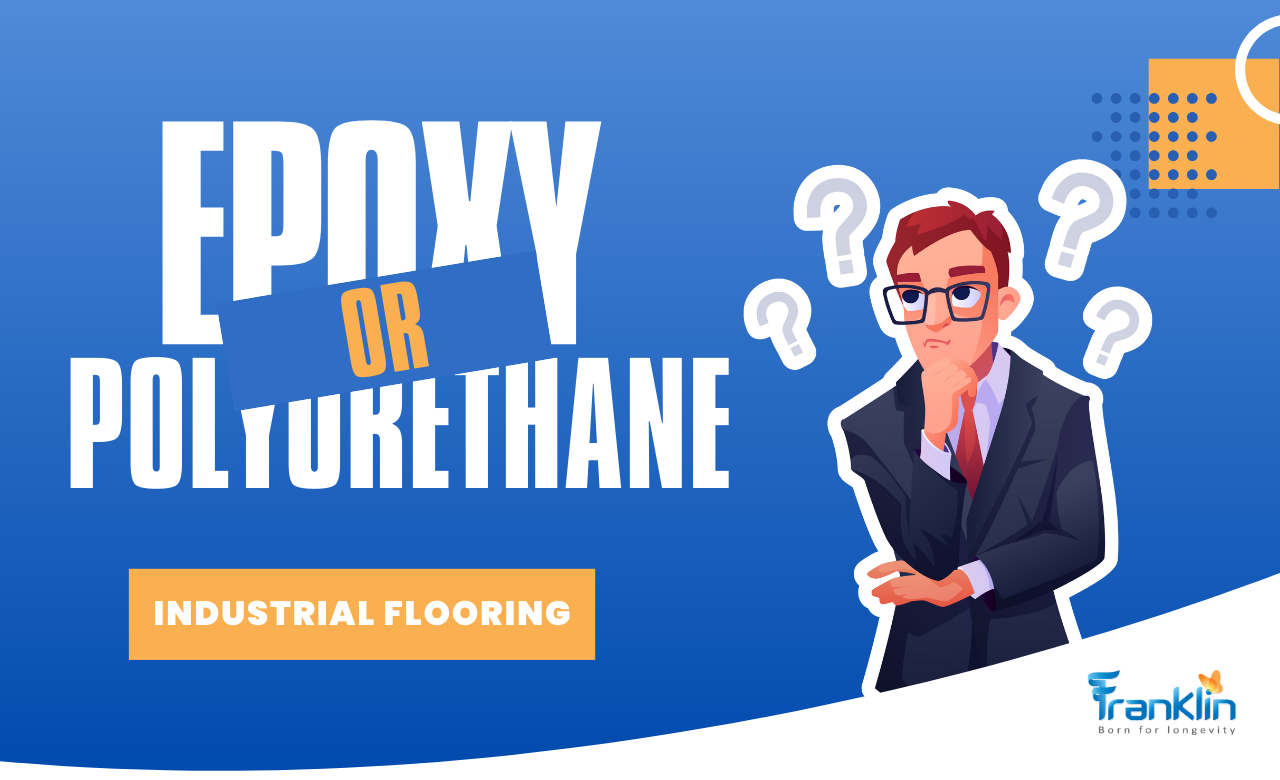Are you feeling confused about choosing between an epoxy flooring solution and polyurethane flooring?
First of all, you must think about what your place really needs.
Even though Epoxy is stronger at first and can handle chemicals very well, polyurethane is better for places that face sudden temperature changes or need floors that bend a little without breaking. Polyurethane lasts much longer, up to 20 to 30 years. Epoxy, more than 10 to 20 years.
In this blog at Franklin Floortech, in association with Berger Fosroc Limited, I’ll walk you through a very detailed comparison of epoxy and polyurethane so that you’ll end up making your mind about what you need.
Epoxy vs Polyurethane Flooring: 4 Major Differences
If it’s really time for you to choose between epoxy and polyurethane flooring for your industrial space, you’ll need to understand four critical differences that impact performance.
These key differences are:
Durability and strength
Temperature tolerance
Flexibility and crack resistance
Installation timing
These four criteria will determine which system is going to best match your facility’s needs.
Durability & Strength
Both epoxy and polyurethane floors are strong and durable, but in different ways.
Epoxy is harder and can handle heavy machines or lots of walking without damage. It also resists chemicals very well.
Polyurethane is more flexible, so it doesn’t crack easily when things hit it or when temperatures change.
Which lasts longer?
Polyurethane wins here, it can last 20–30 years, while epoxy can last 10-15 years in tough conditions:
So, if you need:
- Super strong & chemical-resistant: Choose epoxy
- Flexible & long-lasting: Choose polyurethane
Temperature Tolerance
Both epoxy and polyurethane floors work in hot environments, but differently.
Epoxy has limits – it gets soft above 60°C and brittle in cold. It doesn’t like temperature changes.
Polyurethane handles heat better, staying stable up to 160°C. Its flexibility helps it survive sudden temperature swings without cracking.
Which works best for hot places?
Polyurethane wins here – it’s perfect for food plants and industrial kitchens with heat, steam and daily washdowns.
So, if you need:
- Heat-resistant & flexible: Choose polyurethan
- Chemical-resistant (but not for extreme heat): Choose epoxy
Flexibility & Crack Resistance
Both flooring types are durable, but excel in different ways.
Polyurethane Floors
- More flexible – bends instead of cracking under stress
- Handles temperature changes better (hot and cold)
- Absorbs impacts from heavy machines
- Lasts longer in tough conditions
Epoxy Floors
- Super strong at first
- Great for chemical spills
- Becomes brittle over time
Which lasts longer?
Polyurethane: 20–30 years
Epoxy: 10-15 years in tough conditions
Best choice for:
- Heavy traffic & temperature changes: Polyurethane
- Chemical resistance: Epoxy
Installation & Curing Time
Both flooring types need proper installation, but work differently:
Epoxy Floors:
Takes longer to install (can take up to 3 days to fully cure)
Requires very careful mixing and application
Applied in thin layers (3–5 mm)
Doesn’t tolerate humidity well – harder to install in damp conditions
Polyurethane Floors:
Installs faster (can cure in just 2 days)
Handles humidity better during installation
Applied in thicker layers (about 5mm)
More forgiving during application
Which installs are easier?
- For quick projects: go for polyurethane
- For precision work: go for epoxy
Best choice if you need:
- Fast installation: Polyurethane
- Thin layer system: Epoxy
Remember: Both need good surface preparation, but epoxy is pickier about conditions.
Epoxy vs Polyurethane: Which Flooring Solution is For You
This is the part where you’ve to think carefully about what your space really needs. Epoxy works best for places with heavy machines, lots of walking, or chemical spills. Polyurethane is better if you need protection from sunlight, temperature changes, or want floors that last many years.
Don’t just think about today – consider what your floors are about to face in the future.
You Need Epoxy Flooring Solution If:
Epoxy floors are perfect for tough workplaces that need strong, chemical-resistant surfaces. They’re especially good for food and medicine factories where clean floors are super important. Choose epoxy if:
- Your place has many chemical spills or needs daily deep cleaning
- Heavy machines roll over your floors all day
- You work with food or medicine and need very clean floors
- You want floors that last long with little maintenance
Epoxy gives you tough, easy-to-clean floors that help maintain hygiene standards.
When to Choose Polyurethane Flooring
Polyurethane floors are better for some special situations. They handle hot and cold changes well and resist chemicals too. Pick polyurethane if:
- Your building gets very hot or cold often
- You need floors installed fast
- You want floors that aren’t slippery when wet
- You run a hospital or food business needing clean floors
- Many forklifts or heavy machines move around your space
Polyurethane bends instead of cracks, lasts long, and keeps workers safe. It’s the smart choice for busy places with changing temperatures.
Epoxy vs Polyurethane for Crack Repairs: Which is Better?
Let’s be very straightforward – if you need a permanent fix, choose epoxy.
If you need a quick temporary solution, then choose polyurethane.
Why is Epoxy a Permanent Solution?
- Makes a super strong bond with concrete
- Flows smoothly into cracks (self-leveling)
- Lasts longer and handles wear better
- Can be re-injected later if needed
- Best for serious structural cracks
Why is Polyurethane a Temporary Solution?
- Easier to apply (contractors often prefer it)
- Expands like foam when injected
- Harder to fix later if problems come up
- Not as strong for big structural repairs
Which Flooring is Best for Which Industry?
Let me say this again – Epoxy works best for heavy factories and auto shops, while polyurethane is ideal for food plants and hospitals.
If I have to choose, I’ll think about:
How much traffic will my floors get?
What chemicals will they face?
What’s the temperature variation in my facility?
Industry Applications
Food & Beverage Facilities:
Pick polyurethane because it:
- Handles hot/cold changes better
- Lasts 30+ years (vs epoxy’s 1–5 years)
- Stops germs better
- Resists cleaning chemicals
Heavy Manufacturing:
Pick polyurethane for:
- Bending without breaking
- Surviving heavy machines
- Handling temperature swings
- Lasting longer than epoxy
Hospitals & Clinics:
Choose polyurethane for:
- Staying clean with strong cleaners
- Not cracking under medical equipment
- Handling heat from sterilization
- Looking good longer
Chemical Plants:
- Epoxy: Best for acid spills
- Polyurethane: Better for hot/cold areas
Both stop leaks and germs, but polyurethane lasts longer in sunlight
Auto Repair Shops:
- Epoxy: Best for oil/chemical spills
- Polyurethane: Better for welding areas (won’t burn)
Warehouses:
- Epoxy: Best for heavy forklifts
- Polyurethane: Better for cold storage
FAQs: Epoxy vs Polyurethane Flooring
Can epoxy and polyurethane be used together?
Yes – a hybrid system works best for many facilities:
- Epoxy base provides strong adhesion and durability
- Polyurethane topcoat adds flexibility and UV protection
This combination increases chemical resistance, impact durability, and performance in temperature-varying environments.
Which flooring is better for wet areas?
Polyurethane is clearly the better option because:
- It won’t peel or crack from constant moisture
- Stays less slippery when wet compared to epoxy
- Naturally resists mold and bacteria growth
- Ideal for food plants, breweries, and poolside areas
How often do these floors need resealing?
- Epoxy: May need resealing every 1–3 years
- Polyurethane: Lasts up to 5–10 years before resealing
Note: Heavy traffic and chemical exposure may require more frequent maintenance.
Can these floors be installed over existing concrete?
Yes, but preparation is key:
- Epoxy: Requires a clean, dry surface with all cracks pre-filled
- Polyurethane: More forgiving of minor imperfections due to flexibility
Why Choose Franklin Floortech?
Franklin Floortech is a trusted applicator of Berger Fosroc industrial flooring systems in Bangladesh. Our certified team ensures:
Professional application
Detailed site inspection
Long-lasting flooring solutions
“We don’t just coat floors – we build durable surfaces for tomorrow’s industries.”
Book Your Free Consultation:
Phone: +8801711-262823
- Website: www.franklin.com.bd
Locations: Dhaka | Chattogram | Nationwide service





